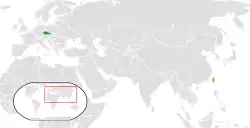Czech Republic–Taiwan relations
The Czech Republic and Taiwan (officially the Republic of China, shortly ROC) maintain unofficial relations since the recognition of the One-China policy of the People's Republic of China by Czechoslovakia from 1979. From 1931 until 1949, however, the First Czechoslovak Republic had international relations with the Republic of China and the Czech Republic maintains official relations with the People's Republic of China.
 | |
Czech Republic |
Taiwan |
|---|---|
In the absence of official diplomatic relations, the Czech Republic has the Taipei Economic and Cultural Representative Office in Prague while Taiwan has the Czech Economic and Cultural Office in Taipei.
Economy

Taiwanese electronics manufacturer Foxconn runs its largest European operations in the Czech Republic, the company's European Union (EU) hub.[1] The subsidiary, named Foxconn CZ, is by profit one of largest companies in the Czech Republic.[2]
In August 2020, Czech Senate President Miloš Vystrčil traveled to Taiwan on an official visit to "promote business links" between the two countries.[3]
Prague–Taipei relations

In August 1968, the ROC (then an internationally recognized entity of “China”) was among the ten members of the United Nations Security Council to condemn the Warsaw Pact invasion of Czechoslovakia led by the Soviet Union, who the latter opposed the resolution.
In 2019, Czech Republic–Taiwan relations warmed when the Prague city council under Mayor Zdeněk Hřib voted to cancel sister city relations with Beijing due to the unwillingness of Beijing to renegotiate the inclusion of a One-China policy clause. While respecting the policy itself, Prague deemed inappropriate to express national policy in a sister city agreement.[4][5] In December 2019, Prague announced it plans to sign a sister city agreement with Taipei in 2020.[6]
Diplomat exchanges
Jaroslav Kubera, President of the Senate of the Czech Republic, planned a visit to Taipei prior to his death, prompting threats of retaliation from China's Ministry of Foreign Affairs.[7] Kubera's successor, Miloš Vystrčil, however, led a delegation to Taiwan that arrived in Taipei on August 31, 2020. While there, Vystrčil gave a speech, declaring "I am a Taiwanese," echoing John F. Kennedy's famous "I am a Berliner" speech. The People's Republic of China said that Vystrčil would "pay a heavy price" for visiting what it considers to be a renegade province. Meanwhile, the President of the Czech Republic said of the trip that “I consider it boyish provocation.”[8]
Health
In March 2020, the Czech Republic and Taiwan signed an official partnership to fight COVID-19, the first such agreement signed by Taiwan.[9]
See also
References
- Made in the EU: Foxconn in the Czech Republic
- "Foxconn v ČR". Archived from the original on 2019-10-19. Retrieved 2020-01-07.
- "Czech Senate speaker leaves for Taiwan visit, angering China". Reuters. 29 August 2020.
- Prague vs. Beijing: Estranged Sister Cities Archived 2020-02-29 at the Wayback Machine. The Diplomat. Manuel Eckert and Richard Q. Turcsányi. October 08, 2019.
- Prague city council moves to axe partnership with Beijing Archived 2019-12-11 at the Wayback Machine. Reuters. OCTOBER 7, 2019.
- What’s Behind the Prague-Taipei Sister City Ties? Archived 2019-12-27 at the Wayback Machine. The Diplomat. Gregory Coutaz. December 17, 2019.
- Satter, Raphael; Carey, Nick (February 19, 2020). Gopalakrishnan, Raju; Popper, Helen (eds.). "China threatened to harm Czech companies over Taiwan visit: letter". Reuters. Archived from the original on February 19, 2020. Retrieved February 19, 2020.
- "Czech president tries to tamp down China anger after speaker's Taiwan trip". Reuters. 2020-09-06. Archived from the original on 2020-09-09. Retrieved 2020-09-09.
- Hutt, David. "Taiwan sees doors open in Europe as virus response earns respect". asia.nikkei.com. Nikkei Asian Review. Archived from the original on 13 April 2020. Retrieved 14 April 2020.
External links
- Czech Economic and Cultural Office
- Taipei Economic and Cultural Office in the Czech Republic (in Chinese and Czech)

